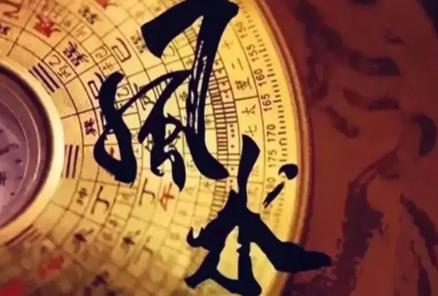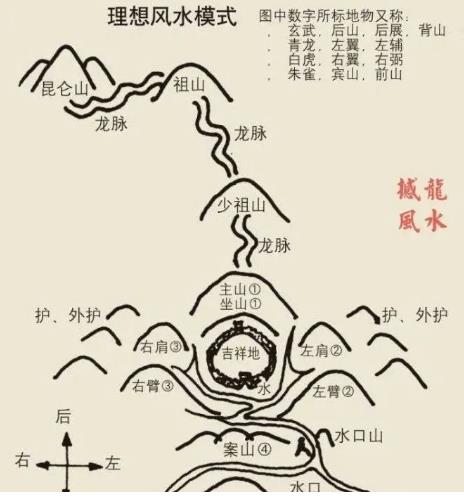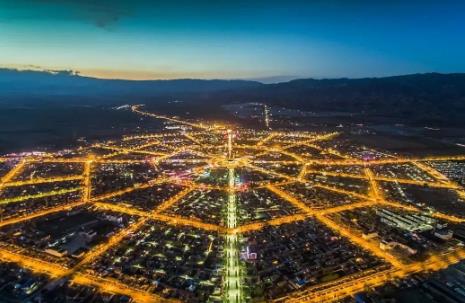
Feng Shui Master: Feng Shui, as one of the oldest essence of Chinese culture, has always been controversial due to its unique presentation and application fields, especially regarding whether it has scientific basis. This debate has never stopped.
In a 2019 interview program called ‘Let’s Talk’,Famous paleontologist\Professor at Tianjin UniversityWang Qiheng,He corrected the name of Chinese feng shui and pointed outFeng Shui is landscape architecture,Before the Han Dynasty, it was calledGeography。
In 2006, South Korea wanted to apply for the World Heritage status of our feng shui, but it was rejectedProfessor Wang Qiheng successfully prevented it using empirical evidence from our 3000 year history of feng shui development。
Professor Wang Qiheng pointed out that Feng Shui studies the dialogue between geographical environment, ecology, architecture, and landscape, as well as the dialogue between architecture and architecture。
So, what are the unknown and mysterious aspects of Chinese feng shui? Why did people from emperors to commoners in ancient times trust feng shui so much? Why do many successful people, businessmen, and friends who believe in feng shui still hire professional feng shui masters to adjust their company and home feng shui? What are the mysteries and functions of Feng Shui? Below, we will discuss in detail the development and application of Chinese Feng Shui!
The Inspiration of Feng Shui on Modern Architectural Planning and Design
fengshuiIt is the guiding ideology and practical operation technology of ancient Chinese architecture, which is related toChinese Construction StudiesandChinese gardening and other elements constitute the three pillars of ancient architectural theory.
The ancient and simple environmental engineering of “unity of heaven and man”
The environment is the object, and humans are the subject。 That is to say, humans should conform to nature, understand the timing of heaven and the location, and be able to bring about a situation of “harmony between people”。 If we violate the laws of nature, it will bring disaster。
The ancient Chinese materialist philosopher Xunzi wrote in his essay “On Heaven”: “Heaven’s actions are constant, not for the survival of Yao, not for the downfall of Jie。 If we respond to them with governance, it will bring good luck; if we respond with chaos, it will bring bad luck。。。 If we follow the Tao but fail (violate), then heaven cannot bring disaster; if we violate the Tao and act recklessly, then heaven cannot bring good luck。
In the human living environment, what is closely related to nature isAtmosphere, geosphere, hydrosphere, and biosphere.
The atmosphere gives people sunshine, air, and wind; The soil circle provides people with a foundation for survival, land, and mineral deposits; The water circle provides people with water for daily life and production; The biosphere provides humans with edible animals and plants, collectively known as the human living environment。
Since its birth, humans have been very cautious in choosing their living environment, and the concept of “seeking good fortune and avoiding bad” has given rise to a whole set of environmental theories,Feng Shui emerged on the premise of satisfying people’s survival desires。
Modern architectural feng shui
Feng Shui is one of the three pillars of ancient Chinese architectural theory。
After being recognized by modern people, traditional feng shui theory gradually evolved into modern architectural feng shui, also known as spatiotemporal environmental science。
Modern architectural feng shui involvesGeophysics, Hydrogeology, Astronomy, Meteorology, Environmental Science, Architecture, Ecology, Human Life Information Science, and:Aesthetics, Ethics, Religion, FolkloreComprehensive scientific theories of various disciplines。
Feng Shui cannot be defined solely by simple science or superstition。 In fact, it goes far beyond this scope。 It is the wisdom and cultural genes accumulated over thousands of years, and is a great subject。
Feng Shui is essentially a natural philosophyThe complementary nature of Feng Shui lies in emphasizing the harmony between humans and nature, which is a natural philosophy。
At the same time, Feng Shui also reflects the relationship between humans and nature, summarizing the laws and conclusions that guide our lives and bring people a harmonious and comfortable life。
Many of these philosophical ideas have been reflected, so it is not an exaggeration to say that it is a natural philosophy。

Interpreting Architectural Feng Shui with Science
Many people believe that Feng Shui has no basis, but in fact, it is not,Many theories in Feng Shui are formulated based on scientific theories.
The so-called taboos are judged based on scientific theories and the needs of the human body。
Magnetic Field and Feng Shui
In feng shui research, ultrafine ions and magnetic fields have significant positive and negative effects on the human body。 These energies change with changes in the environment and also with changes in the body’s own field information。
A positive magnetic field can make people happy, quick thinking, healthy, and long-lived, while a negative magnetic field can cause confusion and slow thinking。
Ecological Architecture and Feng Shui
Northerners live in brick houses, people from the northwest plateau dig cave dwellings, and people from Yunnan build bamboo stilt houses。 These are all basic reflections of ecological architecture in the human brain。
The purpose of Feng Shui is to regulate qi, that is, to seek vitality。 In fact, when people are looking for a place to live, they can choose a place with a place to live, which is sheltered from the sun, with beautiful mountains and clear waters, flowing water, cheerful plants and trees, singing and dancing birds, and fragrant flowers。
These are quite consistent with the theories of ecological architecture, therefore,The symbiotic relationship between human architectural feng shui and natural organisms is closely related.
Human body information and feng shui
The essence of feng shui lies in the harmonious resonance between venue information and human body information。 According to the theory of destiny, every life has its own unique “destiny”, and the human body’s information is that each individual has their own unique life information。
When natural information is coordinated and synchronized, resonance effects occur, which is called feng shui。
Environmental Landscape Studies and Modern Feng Shui
Environmental landscapes have various physiological and psychological impacts on humans, and modern feng shui combines the simple truths of traditional feng shui with modern environmental landscapes to better interpret them。 It can be seen that environmental landscapes are closely related to modern feng shui。
Hydrogeology and Feng Shui
Feng Shui is closely related to hydrogeology, and the dragon veins commonly used in Feng Shui were born in specific historical environments。 Lying down and listening to underground water is actually knowledge about the direction of mountain ranges in geology。
The idea of protecting dragon veins in Feng Shui coincides with the principles of soil and water conservation and environmental protection in modern geology.
The purpose of hydrogeology and feng shui is to study the relationship between mountains and rivers, geological landforms, mountains, soil, and water, as well as the positive and negative effects of various chemical elements on human psychology, physiology, health, and career, in order to better understand and utilize nature。
The role and importance of Feng Shui
Feng Shui is closely related to the environment, and can be said to be inseparable。 It is also very important in our lives。 Next, let’s understand the role and importance of Feng Shui in architectural environment。
The role of architectural feng shui
Feng Shui in architecture is the soul of ancient Chinese architectural theory and holds a high position in the history of Chinese architecture。
With the development of the times, architectural feng shui has gradually entered the stage of ancient and systematic modernization, combining Chinese and foreign elements as well as modern and traditional elements, forming a unique theoretical system with rich connotations, comprehensive and systematic features。
While Western science praises Chinese architectural feng shui, it is also studying it。 In the global scientific community, with the help of Western humanities, it is gradually integrating with modern feng shui theory。

The importance of architectural feng shui
According to Feng Shui analysis, the quality of Feng Shui affects people’s wealth, health, family harmony, and many other issues, and Feng Shui does so。
The analysis of Feng Shui in layout cannot be analyzed from a simple perspective。 Human life is diverse, involving health, family, school, career, communication, and many other aspects。
The so-called residential feng shui has existed since ancient times, which is the simplest understanding of nature and living environment by ancient people。 In modern society, residential feng shui still holds great significance。
People are very particular about home feng shui, and many people pay attention to the feng shui layout of their homes, how to make their homes prosperous, prosperous, healthy, and peaceful。
The fundamental purpose of home feng shui is to achieve a harmonious unity of indoor and outdoor aura, which can help people achieve the best state of physical and mental harmony, and bring many beautiful things to the family。
After the involvement of Feng Shui, due to significant changes in the surrounding environment, the aura in the human body will also change with the changes in the surrounding environment。
Through this accumulation, the qi field in the body will change, and its fate trajectory will gradually move towards neutrality, forming the good and bad results of feng shui, playing multiple roles in increasing goodness and reducing evil。
Architecture is a form of historical culture and a symbol of the transition from one era to another。 Although buildings are spread all over the world, Chinese feng shui is unique and is a profound cultural history unique to our country。 A good architectural design cannot do without feng shui。
Chinese Feng Shui Official Website Warm Reminder:Feng Shui is a tool for regulating good or bad luck。 Adjusting Feng Shui during good times can increase auspiciousness; When it’s not good, it can reduce its severity, and these effects are still obvious and real! It is recommended to seek guidance from authoritative and professional feng shui masters for environmental adjustment and layout。
Leave a Reply